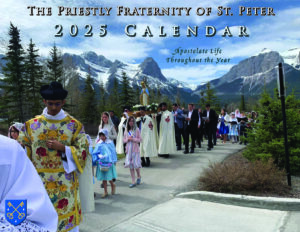Responses to Some Criticisms of Fr. Meeks’ Sermon
After we posted a link last week to a sermon delivered by Fr. Ed Meeks (“Staring into the Abyss”) where he lays out moral principles for Catholics to observe when voting, we received some comments critical of the sermon and our promotion of it.
Fr. Meeks is not a priest of the Fraternity of St. Peter. Nonetheless, as there are traditional teachings of the Magisterium involved in both his sermon and the criticism of it, we thought it beneficial to briefly offer some thoughts on objections that have been raised.
Separation of Church and State
One comment stated that the sermon was unethical in that it violates the separation of church and state.
Separation of Church and state means that the Constitution of the United States prohibits the federal government from declaring a national religion. However, this does not mean that politics are to be free from the influence of religion; such would be impractical, as everyone is motivated by some religious conviction. (Even an atheist is motivated by the rejection of organized religion, which amounts to a creed of its own, and he would lobby accordingly.) The Declaration of Independence admits of the existence of God, and the inalienable rights of life, liberty, and pursuit of happiness that belong to all persons in virtue of being created by Him. So while we render to Caesar what is his, what Caesar has also belongs to God.
The Catholic Church, as founded by Jesus Christ, has moral authority and rights over her subjects; that is, the baptized, and has the responsibility to form their consciences in accordance with natural law and divine. Such promotes a virtuous citizenry (cf. Catechism of the Catholic Church, 2246 ff., on the political community and the Church).
Reciprocally, a Catholic first owes allegiance to the Church, and so must live in a way as to promote the Church’s mission within the country he lives. Therefore, a pastor is fully within his right to instruct the faithful entrusted to his care about the moral principles involved when it comes to voting, to point out the hierarchy of moral issues that must be observed, and where a party or candidate, especially one who claims to be Catholic, fails in these regards. A Catholic who conscientiously observes these when he votes serves then to render to God what is His while he renders to Caesar; these two can never be separated.
Purported Exceptions to the Immorality of Abortion
Another comment tries to admit moral exceptions for abortion in cases of rape, incest, or danger to the life of the mother. Even though these are difficult circumstances surrounding a pregnancy, the Magisterium has never permitted for these exceptions, stating unequivocally in the Catechism:
“Human life must be respected and protected absolutely from the moment of conception. From the first moment of his existence, a human being must be recognized as having the rights of a person – among which is the inviolable right of every innocent being to life.” (cf. CCC, 2270 ff.)
Abortion is at all times an intrinsically evil act against the most fundamental moral principle on the sanctity of all human life. No circumstance can change that. The unborn are truly the least amongst us, and to protect their right to life is indeed to love them as ourselves; therefore, candidates or parties that directly promote abortion find themselves in direct opposition to the perennial teaching of the Church.
The Condemnation of Socialism
Still another comment dismisses Fr. Meeks’ criticism of socialism as a mere dog whistle for the political right.
The Catholic Church has always rejected socialism since its emergence on the world stage in the nineteenth century, because it is fundamentally atheistic and rejects the right to private ownership of property. All the Popes from Pius IX to Benedict XVI have condemned it. In his social encyclical Quadragesimo Anno (1920), Pope Pius XI states:
“If socialism, like all errors, contains some truth (which, moreover, the supreme pontiffs have never denied), it is based nevertheless on a theory of human society peculiar to itself and irreconcilable with true Christianity. Religious socialism, Christian socialism, are contradictory terms; no one can be at the same time a good Catholic and a true socialist.” (n. 120).
The Catechism states:
“The Church has rejected the totalitarian and atheistic ideologies associated in modern times with ‘communism’ or ‘socialism’” (cf. CCC, 2425, 2401).
On Divisiveness in Moral Teaching
Finally, a fourth comment suggests that the sermon is “divisive.”
While it is true that we all wish to live in relative harmony, we should recall the prophecy of Simeon in regards to our Lord: Behold this Child is set for the fall and resurrection of many in Israel, and for a sign which shall be contradicted. (Lk. 2:34)
Christ says that He will set nation against nation, father against son, mother against daughter (cf. Lk. 12:53); the eighth Beatitude tells us to expect persecution on His account (Mt. 5:11). Christ indicates that the peace He brings is dependent upon acceptance of the truth about Himself as being true God (Jn. 14:27), that His words and commandments are to everlasting life (Jn. 6:64), and that truth can be difficult (Jn. 6:61).
So as we try to bear patiently with differences of perspective, charity demands that Catholics uphold all Church teachings in witness to Christ, come what may. He therefore that shall break one of these least commandments, and shall so teach men, shall be called the least in the kingdom of heaven. But he that shall do and teach, he shall be called great in the kingdom of heaven (Mt. 5:19). While we love the sinner, we cannot condone the error.
The moral non-negotiables: the sanctity of life, the sanctity of marriage, and the liberty of Catholics to practice our religion, are things Catholics cannot disagree on and so may cause strain within a mixed community. A Catholic candidate is not exempt from this, and has an even greater moral obligation to uphold them for the sake of the common good, the integral good of the human person, and the promotion of the Church’s mission for the salvation of souls, all of which are never in opposition.

Which Invisible Enemy?
 Throughout the pandemic this year, we have often heard the words “invisible enemy” describing the virus in the efforts to combat it.
Throughout the pandemic this year, we have often heard the words “invisible enemy” describing the virus in the efforts to combat it.
While things have loosened up somewhat, we still hear that this invisible enemy still threatens, and that things could change for the worse at any moment. Perhaps they will.
But we always live with the possibility of things changing drastically at any moment. The Christian should remember that.
For this life will pass, and we must keep our eyes on eternity no matter what befalls us. All is a means to an end.
Fear ye not them that kill the body, and are not able to kill the soul: but rather fear him that can destroy both soul and body in hell. (Mt. 10:28)
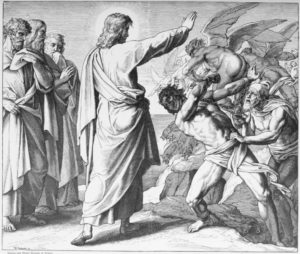
In these uncertain times, we have the certainty of eternity – to be spent either in heaven or in hell.
How different the world would be if everyone responded with similar concern about the far more powerful invisible enemy Christ warns about.
For what doth it profit a man, if he gain the whole world, and suffer the loss of his own soul? Or what exchange shall a man give for his soul? (Mt. 16:26)
October 20, 2020

Shaken Reeds
There is a short political ad from the Biden campaign (usually imposed before a YouTube video) where presidential candidate Joseph Biden talks about the place of his Catholic faith in his life. Research into the origin of the ad revealed that all the voiceover we hear of Mr. Biden is taken from his 2015 video interview with Fr. Matt Malone, SJ, of America Magazine, the media arm of the Jesuits.
 While the interview is cordial and non-confrontational, it reveals a great deal about how he understands Roman Catholicism. Keeping in mind our Lord’s warning about building houses upon sand, Mr. Biden seems to organize his faith – and its expression – around the theme that “everyone should be treated with dignity,” which he says is at the heart of Catholic social doctrine. Along with that, we have “the obligation to fight against the abuse of power” in all its forms, which he considers the cardinal sin of humanity, an impression made upon him by his late father, whom we pray may rest in peace.
While the interview is cordial and non-confrontational, it reveals a great deal about how he understands Roman Catholicism. Keeping in mind our Lord’s warning about building houses upon sand, Mr. Biden seems to organize his faith – and its expression – around the theme that “everyone should be treated with dignity,” which he says is at the heart of Catholic social doctrine. Along with that, we have “the obligation to fight against the abuse of power” in all its forms, which he considers the cardinal sin of humanity, an impression made upon him by his late father, whom we pray may rest in peace.
Now at face value, we will not find many people who would disagree with this; we all want everyone to be treated with dignity and respect as fellow human beings. But these platitudes have little depth.
If we dig a little bit below the surface, a question that arises is just how does Mr. Biden understand the mission of the Church? Why does the Catholic Church exist at all?
Since he goes on to say that “all confessional faiths” share in this goal (do they really?), where does he place Catholicism in the mix? Is it just one among many “equal” faiths, one among many “equal” paths to God?
Furthermore, when it comes to the person of Jesus Christ, citing encounters our Lord had with figures like Mary Magdalene and lepers, Mr. Biden explains that our Lord is “the embodiment of what God wants us to do. All Christ did is consistent generically with what we are supposed to do – treat everyone with dignity.”
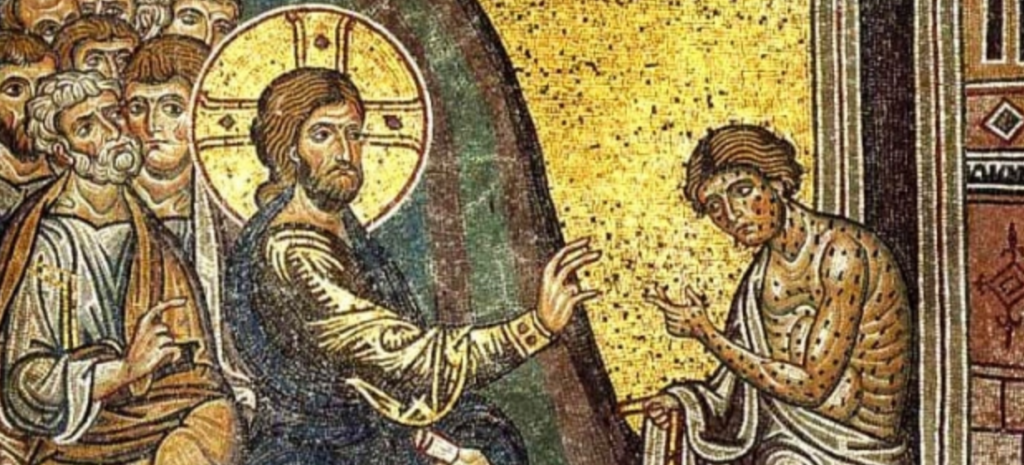
Now while Christ did say Learn from Me, for I am meek and humble of heart, and while He did also say Love your neighbor as yourself, this vague idea of our Lord prompts an even more important and critical question: is Jesus Christ true God or not?
All these questions are quite legitimate because Mr. Biden, a declared practicing Catholic, is a public servant running for the highest office in the United States. Keep in mind that morals follow from doctrine: what a person believes determines how he acts. So while accounting for human weakness, the more firmly a man holds to a set of doctrine, the more he will strive to act consistently with it.
The contrary is equally true; the more a man deliberately acts contrary to his beliefs, the more those beliefs are eroded, changed, and ultimately abandoned. This readily applies to anyone: no one is without religion; everyone follows a creed, and everyone acts based upon it (even an atheist).
Therefore, it is most normal to want to know how seriously Mr. Biden believes, because it is legitimately expected that the Catholic Faith inform how Mr. Biden intends to govern if he were elected to the presidency.
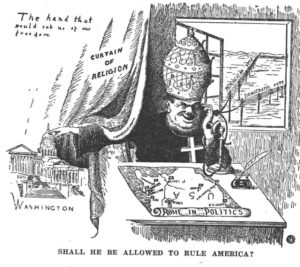 Indeed there has been a long historical prejudice in this country over Catholic citizens holding high public office because of a Catholic’s allegiance to a “foreign power” known as the Pope and Magisterium.
Indeed there has been a long historical prejudice in this country over Catholic citizens holding high public office because of a Catholic’s allegiance to a “foreign power” known as the Pope and Magisterium.
But the Papacy is not a temporal authority in its essence; it is a spiritual and moral authority which originates in Jesus Christ, true God and true Man, with the express purpose and mission of guiding all souls towards repentance from sin and eternal life based upon the revelation of Christ.
Therefore, the Church is there to guide the administration and exercise of temporal power, to call out its abuse, but never to usurp it. While mindful of our Lord’s words to render to Caesar what is his, and to God what is God’s, the Church insists that, if there is a conflict between the two, the problem must be on the side of Caesar.
The Church’s very existence indicates that there is a hierarchy of power within the cosmos, and so the Church rightfully expects her children (that is, the baptized) to respect this reality, imposing a grave moral obligation to act accordingly in genuine observance of the order of the Great Commandment, and this most especially in the case where a person has been given care of the common good. You are the light of the world Christ told His Apostles (Mt. 5:14). We must be witnesses of the Light (cf. Jn. 12:36) for no one lights a candle (that is, receives Baptism) and then hides it under a bushel basket; rather it is placed on a lampstand in order to give light to the whole house. (Mt. 5:15) And recall further the sorry fate of the man who received a talent and buried it (cf. Mt. 25:24).
This naturally unsettles public servants who have more concern for the things of Caesar than for God’s.
The presence of a serious Catholic in their midst who has the supernatural courage to act based upon the Church’s teachings is both a threat and indictment.
This does not mean that a Catholic president, or legislator, or judge should suddenly proclaim Catholicism to be the national religion of our country. In a system such as ours, that could be considered an abuse of power since it runs contrary to the Constitution, something the Church tolerates. No, the arrangement is not ideal, but under this government the Church at least can exist and have some influence, although we see this threatened for various reasons nowadays.
But what it does mean is that a Catholic president has the moral obligation to attempt to rid our land of immoral and evil laws and organizations on account of his profession of Faith, while also promoting the influence of the Church and her welfare. If a Catholic candidate is on record in support of evil laws and organizations, either personally or by affiliation with a political party whose official platform supports these, he has a moral obligation to recant, abandon the party if he cannot immediately change it, and do whatever is within his power to correct any damage he has caused.
 This begins with the most fundamental of rights, the right to life, and that right being safeguarded in all times and circumstances to the weakest and most vulnerable – the unborn. To say that there are more pressing moral and social issues that plague our country is to completely miss the point; poisoning the river at its source poisons the lake into which it flows.
This begins with the most fundamental of rights, the right to life, and that right being safeguarded in all times and circumstances to the weakest and most vulnerable – the unborn. To say that there are more pressing moral and social issues that plague our country is to completely miss the point; poisoning the river at its source poisons the lake into which it flows.
There is a hierarchy of moral issues, and so a grave error on the fundamental right to life poisons how all life is regarded and demands correction, especially from a Catholic who has been given the power or influence from God, the source of all authority, to attempt to do so. What about “treating everyone with dignity” and “fighting abuse of power?”
We recall California Senator Dianne Feinstein’s remark a few years ago to Judge Amy Coney Barrett, Catholic mother of seven, that “the dogma [Catholicism] lives loudly within you.” Sen. Feinstein prefaced her remark by saying “dogma and law are two different things” and dogma “is a concern when you come to big issues that large numbers of people have fought for for years.”
Evidently this is a reference to abortion.
On this precise subject, Mr. Biden stated in his interview, and has not since recanted, that while “he is prepared to accept de fide doctrine [that is, he is personally opposed to abortion], he is not prepared to impose a ‘rigid’ – not ‘rigid’ because that sounds pejorative – rather a ‘precise’ view born of his faith upon others.”
However, this is not as if Mr. Biden would impose on everyone belief in the Holy Trinity. Raymond Cardinal Burke in an interview on EWTN states that “abortion is not a confessional belief but has to do with the natural law.”
Let us remember that nature and revelation have the same source – God – and so the two can never be opposed; Sen. Feinstein is incorrect then, because law is related to dogma, as law is an expression of it.
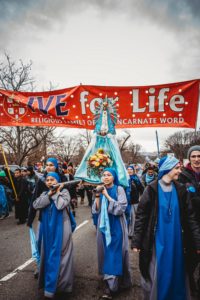
Self-evident truths such as life and liberty are a type of dogma; laws flow from that. Faith in the Incarnation should make those even more self-evident. In virtue of having the gift of the Catholic Faith through Baptism, Mr. Biden should have a firmer conviction and certainty of the natural law right every human being has to life. His private “belief” in this matter cannot be divorced from his public policy; he cannot observe a public stance that is either directly contrary or indifferent to it without committing grave sin and causing scandal.
He publicly claims that abortion is the law of the land and that he will do all he can to make sure it stays that way; therefore, any Catholic who supports him, or aligns oneself with a political party that supports him, would be in proximate cooperation with evil and would commit a grave sin, regardless if someone says he or she is “personally opposed to it” also.
The stance on life is not a disagreement in perspective or approach between political parties.
It is a moral absolute that admits no compromise, and is the issue that must rise to the top on election day. Abortion, which is the ugly daughter of a contraceptive and divorce-happy culture, must be eradicated, along with its own ugly daughters of pornography, prostitution, sex trafficking, and child exploitation.
So while Mr. Biden’s interview reveals a somewhat poor catechesis about what the Church is, we cannot help but wonder if his radical disregard, after so many years, of the Church’s (and the natural law’s) moral teaching on life has adversely affected and eroded how he should believe.
Where is his moral compass then? Can he even have one? Is Jesus Christ True God and True Man, who died on a Cross and rose from the dead, to Joseph Biden?
Or is Jesus Christ just some philanthropist who came to teach us how to be “nice” to each other without pricking the conscience about the silent screams in the background?

Is Mr. Biden more a reed shaken in the wind of public opinion, a product of political ambition, in stark contrast to the fortuitous and convicted John the Baptist whom Herod had to put to death when his warnings became inconvenient?
Pray that Mr. Biden comes to see and amend the profound error of his ways lest, like Herod, he renders himself incapable of being someone Christ can talk to.
October 16, 2020

Purgatory in the Celtic Folklore of All Hallows Eve
Although we still can see a connection between All Saints and All Souls by their mere proximity on the calendar, we seem to have lost a sense of Hallowtide, in its pre-1955 form, as a discrete season with several overarching themes.
One of those themes is praying for the dead in Purgatory.
Of course, All Souls Day is the quintessential day for that–and that has not changed, even in the aggressively pruned calendar of 1970.
But All Hallows Eve has also played a key part in praying for the dead, particularly in Celtic countries. And despite the feverish imaginations of some authors, it seems to be Celtic Catholicity, not Celtic paganism, that is most responsible for shaping the original folklore of what we know today as Halloween.
At first blush, the liturgical books seem not to offer much evidence of this.
We could certainly observe how in the vigil Mass–the Mass of Halloween–the Gradual and the Offertory take the future tense: Exsultabunt sancti in gloria, laetabuntur in cubilibus suis: “The saints shall rejoice in glory; they shall be joyful in their beds”. This passage from Psalm 149 points toward the eventual establishment of the Church. It also takes on a new, deeper meaning in the context of a vigil Mass, pointing forward to the next day’s feast. And we could further admit a third application of this future tense: the freeing of the souls currently in Purgatory. These souls are as-yet-unrealized saints–being led inexorably to that future joy just as surely as those on earth today who will be raised to the altars.
Yet admittedly, that inference by itself is not terribly compelling evidence.
It is, rather, in Catholic folklore and devotional life that Halloween really begins to show itself not only as a preparation for the celebration of the Church Triumphant, but also as a preparation for relieving the Church Suffering.
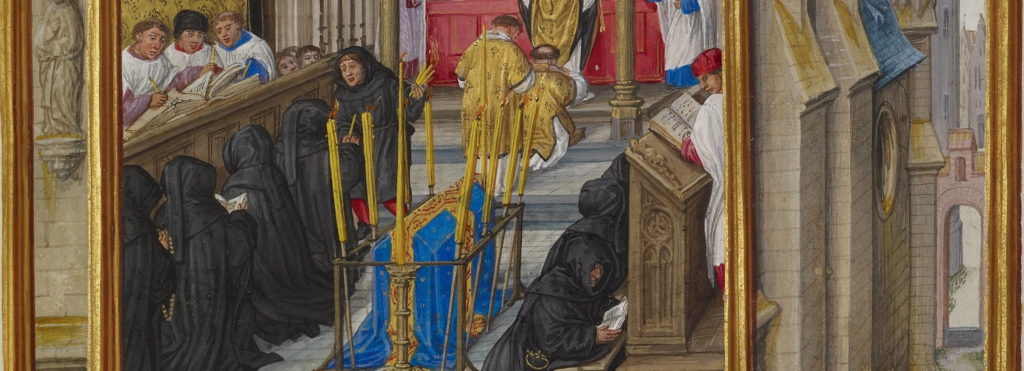
For instance, a devotion in Celtic lands was the recitation of “Black Vespers”, or Vespers of the Dead, at the parish church on the vigil, followed by a trip to the cemetery to pray for the dead. In Brittany, hymns would be sung at charnel houses as if the bones were beseeching the living for prayers, and a folk belief was current there that the souls of the dead were freed from Purgatory on this day and allowed to visit their homes and participate at Mass.

That folk belief may well have been inspired from Black Vespers, whose opening line is: Placebo Domino in regione vivorum, commonly translated as: “I will walk before the Lord in the land of the living”. It seems quite natural for this phrase to have powerfully influenced the medieval mind, especially given the common contemporary images of memento mori and the “Dance of Death,” featuring skeletal figures dancing with living men and women.
In Ireland’s County Kerry, a large uncut loaf and a jug of water were, somewhat superstitiously, put out for the Holy Souls on Halloween night. And even outside the Celtic-speaking lands and under the strict legal injunctions against certain Halloween festivities of post-Reformation England, the vigil remained there a day for children to beg for “soul cakes” in return for prayers for the dear departed.
All Hallows Eve among the Celts and the English was both a day to liturgically prepare for the great octave of All Saints and a day to devotionally prepare for All Souls. And this particular combination, it seems, is what is at root of the modern holiday.
While deprecating, of course, the flat-out immorality and neopaganism that has crept into Halloween as currently practiced in the United States, it would still seem a worthwhile goal to fight for its original intention and spirit as part of our Catholic patrimony.
Not just for our own sakes, but especially for the souls in Purgatory, who are counting on us for prayers and Masses on their behalf.
October 14, 2020

“Staring into the Abyss”: An Election Homily by Fr. Ed Meeks
We recommend to Missive readers the following powerful homily on the US election, given by Fr. Edward Meeks of Christ the King parish in Towson MD:
October 13, 2020

Sacraments and Sacramentals
by Fr. William Rock, FSSP
One often hears that the Sacraments work ex opere operato (i.e. by virtue of the action itself) while Sacramentals work ex opere operantis (i.e. by virtue of the one performing the work).
While this is a helpful way to distinguish the modes in which they work, stating that Sacramentals work ex opere operantis does not fully capture how Sacramentals produce their effects for the ones who use them. But before exploring that point more fully, it is important to have a clear idea of what a Sacramental is.
The Sacraments are outward signs instituted by Christ which confer grace. According to St. Thomas Aquinas, the Sacraments are also “signs in protestation [declaration] of the faith” (S.T. III, q. 61, a. 4, c). Sacramentals, for their part, are “things or actions which the Church uses in a certain imitation of the Sacraments, in order, in virtue of her prayers, to achieve effects, above all of a spiritual nature” (CIC/17, §1144).
Sacramentals, like the Sacraments, are signs of the Church’s faith, and both Sacraments and Sacramentals produce spiritual effects, albeit in different ways. Unlike the Sacraments, the Sacramentals were instituted by the Church, not by Christ.
Traditionally, Sacramentals were divided into four different classes: (1) ceremonies customarily associated with the Sacraments (e.g. the anointings with the Oils at Baptism, blessings at Mass); (2) independent religious actions (e.g. blessings outsides of the celebration of the Sacraments); (3) the religious use of blessed and consecrated items (e.g. using a blessed Rosary to pray); (4) the blessed and consecrated items themselves (e.g. Holy Water, the blessed Rosary). Generally, when one uses the word “Sacramental,” it is being used in the fourth way, to indicated a blessed or consecrated item, but as was just see the word “Sacramental” has a fuller, much more extensive meaning.
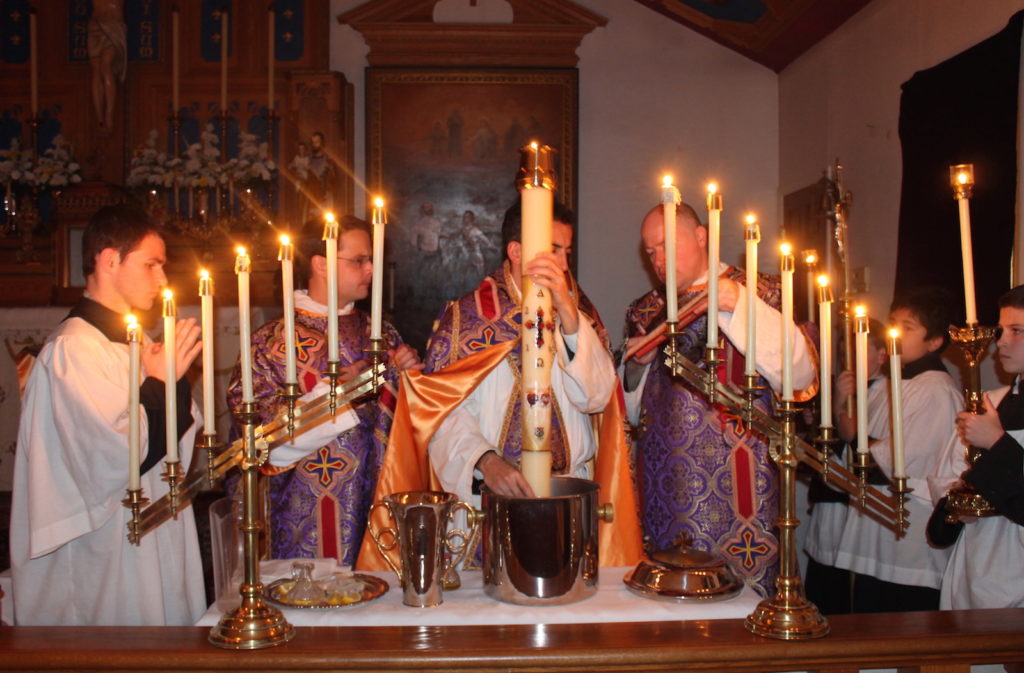
Regarding the first type of Sacramentals – ceremonies customarily associated with the Sacraments – as they are used in the Mass, the Council of Trent said the following:
And since the nature of man is such that he cannot without external means be raised easily to meditation on divine things, holy mother Church has instituted certain rites, namely, that some things in the Mass be pronounced in a low tone and others in a louder tone. She has likewise, in accordance with apostolic discipline and tradition, made use of ceremonies, such as mystical blessings, lights, incense, vestments, and many other things of this kind, whereby both the majesty of so great a sacrifice might be emphasized and the minds of the faithful excited by those visible signs of religion and piety to the contemplation of those most sublime things which are hidden in this sacrifice. (Session XXII, Doctrine Concerning the Sacrifice of The Mass, Chapter 5, The Ceremonies and Rites of The Mass.)
As was noted previously, the Council teaches that these ceremonies were instituted by the Church and even claims their use is in accordance with apostolic discipline and tradition. Additionally, what Trent said regarding the use of Sacramentals in the Mass can also be applied to the Sacramentals used in the celebration of the other Sacraments, namely that the use of these Sacramentals is in accordance with human nature and that “the minds of the faithful excited by those visible signs of religion and piety to the contemplation of those most sublime things which are hidden” within the Sacraments.
Moving from the first type of Sacramental, the remaining three are often interconnected, but not always. The second type – independent religious actions – includes those ceremonies which produce blessed objects (the fourth type) which can then be used by the faithful (the third type), but it is not always the case. Some Sacramentals of the second type (independent religious actions), such as those use to invoke blessings on persons, are used to implore God’s favor on the one being blessed without him being set aside for a religious use. The being said, however, one cannot have a blessed item to use without these independent religious actions.
When an item is blessed in one of these independent religious actions, a new relationship is formed between the item, the Church, and God. In such a ceremony, a minister speaking in the person of the Church (in persona Ecclesiæ) asks God to produce certain effects when the item is used. For example, the blessing of a Rosary reads in part as follows:
Let it [the Rosary] be endowed with such power of the Holy Spirit, that whoever carries it on his person or reverently keeps it in his home, or devoutly prays to you while meditating on the divine mysteries, according to the rules of his holy society, may fully share in all the graces, privileges and indulgences which the Holy See has granted to this society. May he always and everywhere be shielded from all enemies, visible and invisible, and at his death deserve to be presented to you by the most blessed Virgin Mary herself, Mother of God.
Two things should be noted regarding the requested effects. First, different specific effects are being requested (e.g. being shielded from enemies, being presented to God at death by the Virgin Mary). Secondly, all the intended effects are expressed as being conditional, not guaranteed. How this is conveyed in the original Latin is expressed in the English translation by the word “may”. An explanation of how a sacramental produces its effects will shed light on why these two observations are important and will also explain why Sacramentals do not work purely ex opere operantis.
Let us imagine someone goes to a store and buys a Rosary. Before it is blessed, she uses it to pray. God, looking down from Heaven, sees and thinks to Himself “she is using those beads to keep track of her prayers” and the spiritual fruit which she gains from the use of the that Rosary and saying her prayers will be dependent on the intensity of her devotion (her ex opere operantis) and God’s love for her. After a few days, she has her Rosary blessed.

The next time she uses it, God, looking down, thinks to Himself “she is using those beads to keep track of her prayers, but my Church, in the person of one of her ministers, asked that I grant certain gifts to one who uses that particular Rosary”. God then considers each of the requests made by His Church regarding the use of these Rosary beads and then fulfills them, according to His wisdom, mercy, and love. Now, not only are the effects produced dependent upon devotion of the girl praying (her ex opere operantis), but certain effects produced are also depend upon the ex opere operantis Ecclesiae as the requests made by the Church over these Beads are answered by God based, not only on His love for the girl praying, but also based on His love for His Church.
From the above, we can see that the ex opere operantis Ecclesiae effects, produced by God in conjunction with the use of the Church’s Sacramentals, are dependent upon what the Church requests for when she blesses the item and God’s own wisdom in the distribution of His gifts. This, then, sheds lights on why the blessing of the Rosary was written as it was – with the Church requesting, but not guaranteeing, certain effects. To further illustrate this point, The Old Catholic Encyclopedia states the following:
The special virtue recognized by the Church and experienced by Christians in the Sacramentals consists in the official prayers whereby we implore God to pour forth special graces on those who make use of the Sacramentals. These prayers move God to give graces which He would not otherwise give, and when not infallibly acceded to it is for reasons known to His Wisdom. God is aware of the measure in which He should bestow His gifts…All the Sacramentals have not the same effect; this depends on the prayer of the Church which does not make use of the same urgency nor have recourse to the same Divine sources of merit. (s.v. Sacramentals)
The different ceremonies used by the Church explain why the use of one blessed item (say Blessed Salt) is said to produce different effects when compared to the use of another item (say a Rosary). Additionally, this means that when there are different ceremonies and prayers used in the blessing of similar items, say two Rosaries blessed using different ceremonies and prayers, the possible divine favors associated with the use of one will be different from the divine favors associated with the use of the other. Not all blessings are the same, nor do all blessings request God to provide the same divine gifts. It is advantageous to the faithful, then, not only to have their items blessed, but also to ensure that the blessings used fully express the specific effects the Church wishes to attach to each different type of item in order to ensure that the greatest possible spiritual benefit, from the reverent and devout use of their Sacramentals, may be received.
Fr. William Rock, FSSP was ordained in the fall of 2019 and is currently Assistant Pastor at Mater Misericordiae parish in Phoenix, AZ.
October 12, 2020

Authority and the Open Mind
We need authority to live almost as much as we need air and sunlight.
 Authority is required for order and harmony. We move to a new location and ask someone we know if he could recommend a good doctor; in other words, we use that person as an authority. We are selective in what avenues we use to obtain accurate news of current events or the weather. We trust the airline who employs the pilot who flies the plane we are sitting on.
Authority is required for order and harmony. We move to a new location and ask someone we know if he could recommend a good doctor; in other words, we use that person as an authority. We are selective in what avenues we use to obtain accurate news of current events or the weather. We trust the airline who employs the pilot who flies the plane we are sitting on.
There could be a long list of examples, but the key point is that we seek out authority in most instances of our lives because we are not competent, are not capable, and don’t have the time to do the individual labor involved in finding out everything on our own.
Even if we were, it would not be appropriate in the majority of cases, as there is an expectation for us to accept the authority structures around a given need or circumstance. We see a dentist’s license displayed on the wall of her office, and that should be sufficient; it would be inappropriate to want to see the scores of her board examinations.
Our reason, made for truth, constantly seeks after trustworthy authority in its search for truth. One trusted authority leads us to another.
But in today’s age where “open-mindedness” is praised as a virtue, the underlying impetus for open-mindedness (particularly in the realm of ethics and morality) amounts to a challenge to established authority. Those wishing to subvert and undermine our society, like any revolutionary force, always need to call into question the structures responsible for that authority’s existence and sow seeds of doubt about its integrity and trustworthiness.
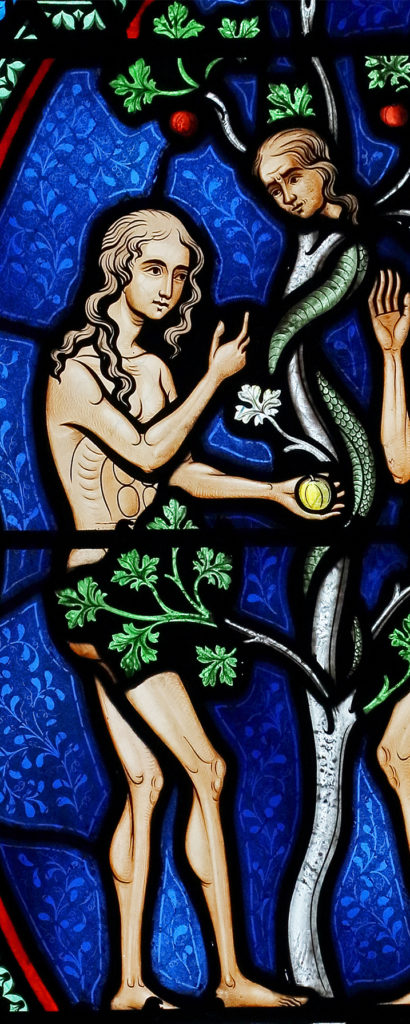 This is as old as Eve, though. The serpent questions her about whether God actually said something and meant it in the way she thought; Satan is quite clever, starting with some truth and then twisting it for his own devices.
This is as old as Eve, though. The serpent questions her about whether God actually said something and meant it in the way she thought; Satan is quite clever, starting with some truth and then twisting it for his own devices.
In tempting Eve, the devil – the first revolutionary – wanted her to transfer where she placed her trust and authority. Some command, some truth, was dependent upon God, and the serpent wanted to compromise that. He succeeded.
After conversing with the devil (one of several mistakes she made), Eve’s correct perception of God’s command was altered; she doubted God’s trustworthiness, acted contrary to His command, and all hell broke loose as a result.
Putting things back together would take a long time and come at a great price.
Evidently, we must select well who we hold in authority; but sometimes we do not get to choose.
We witness with genuine alarm how our civil authority structures are called into question, making us feel a bit exposed, yet these structures still command respect.
It is no different with the Church. Failures within various sectors of the Church can also leave us doubting her authority and the integrity and truth of the Faith. Any legitimate authority carries responsibility with it, and scandal is the result when this responsibility is neglected.
Because of the Church’s mission to proclaim the truth of the Gospel for the salvation of souls until the end of time, the greatest authority and responsibility rest upon her. No wonder why Christ sternly warned about scandal, because it undermines the integrity of an authority that ought to be trusted for the sake of truth and security, causing far-reaching damage (cf. Mt. 18:7-10).
But while the failures of the human element of the Church can be evident and egregious (the behavior of the Apostles at the time of our Lord’s arrest was indicative of what the Church would look forward to through the centuries), our Faith constantly challenges us to look for the divine element through it all and to remember the words of St. Peter: Lord, to whom shall we go? Thou hast the words of everlasting life (Jn. 6:69).
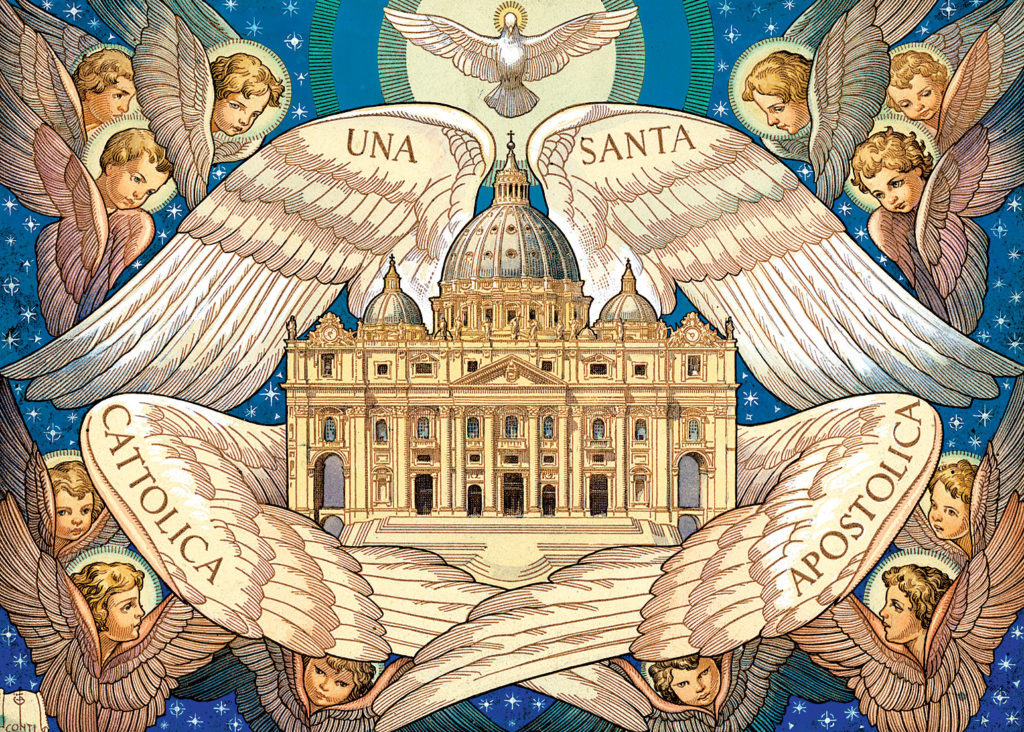
The Church still remains the only revealed and certain path of salvation; the constitution of the Church does not change because of scandal; governance of souls is still dependent upon the hierarchy in union with the Roman See; and the administering of the Sacraments is still left within the hands of priests, men taken from amongst men, ordained for men in things that appertain to God, complete with all their fallen humanity (cf. Heb. 5:1).
Like a music score with all the correct notes written in it, we have the deposit of Faith formulated in both Creed and catechism, with a long Sacred Tradition to rely on when the musicians go off-key.
Despite the failures of the Apostles, our Lord remained faithful to them. He kept all His promises to a motley crew that seemed to deserve so little from Him. He prayed for them, that they be unified, and He endured the Cross for this prayer to be realized through the centuries, in view of the failures and scandals that would come. The kingdom of heaven suffers violence, and the violent bear it away (Mt. 11:12).
So how pleasing must it be to our Lord when we hold firm to the Faith and remain faithful to the structure He established. The truth at times may be obscured by weakness, failure, and scandal, but it is never destroyed and will always rise again.
That belief alone should keep us from being too open-minded when the devil comes to make us doubt the authority of the Church, prompting us to take to heart the words of Justin Martyr: I open my mind like I open my mouth, ready to close it on something solid.
Wise is the man who knows what to close his mind on, because his eternal survival is dependent on it.
October 9, 2020

Press Release: Statement on Calls for the Legal Codification of Abortion in the USA
 Feast of Our Lady of the Rosary
Feast of Our Lady of the Rosary
October 7th, Anno Domini 2020.
Statements have come to our attention in which political candidates have called for the permanent legal codification of abortion throughout the United States.
The Priestly Fraternity of St. Peter wishes to remind all Americans, and the Catholic faithful in particular, of the clear teaching of the Catechism of the Catholic Church: “Human life must be respected and protected absolutely from the moment of conception.”
Furthermore, Holy Mother Church has repeatedly condemned abortion as a grave evil.
Catholic voters in the United States are called to prudently assess candidates, making every effort to support those who can secure the greatest amount of good and least amount of harm. However, no Catholic in good conscience may support any legislation that directly contradicts the moral law.
The Priestly Fraternity of St. Peter renews its commitment, during the month of October, to pray that the grace of divine wisdom direct the deliberations of Congress, and shine forth in all the proceedings and laws framed for our rule and government, and that all judges, magistrates, and other officers who are appointed to guard our political welfare, may be enabled, by God’s aid, to discharge the duties of their respective stations with honesty and ability.
October 7, 2020

The Beads that Vanquish Goliath
 “As for the Rosary, we sometimes meet people who despise it, considering it a devotion fit for children and pious women. Yet, did not Jesus say that we must recapture the humility of little children if we are to enter into the kingdom of heaven? (Mt. 18:3)”
“As for the Rosary, we sometimes meet people who despise it, considering it a devotion fit for children and pious women. Yet, did not Jesus say that we must recapture the humility of little children if we are to enter into the kingdom of heaven? (Mt. 18:3)”
“Here is an example to help you understand the efficacy of the Rosary. You remember the story of David who vanquished Goliath. What steps did the young Israelite take to overthrow the giant? He struck him in the middle of the forehead with a pebble from his sling. If we regard the Philistine as representing evil and all its powers: heresy, impurity, pride, we can consider the little stones from the sling capable of overthrowing the enemy as symbolizing the Aves of the Rosary. The ways of God are entirely different from our ways. To us it seems necessary to employ powerful means in order to produce great effects. This is not God’s method; quite the contrary. He likes to choose the weakest instruments that He may confound the strong. (1 Cor 1:27)”
 “Now, why is the Rosary so efficacious? First of all, on account of the sublimity of the prayers which make it up. The Pater comes to us directly from the love and sanctity of the Eternal Father by the lips of His Son Jesus; the Ave was brought down from heaven with the salutation of the angel Gabriel. The Church, as the interpreter of the needs of her children, has added a petition to this salutation: she makes us repeat to Mary one hundred and fifty times the request that she may be with us now and at the hour of our death.”
“Now, why is the Rosary so efficacious? First of all, on account of the sublimity of the prayers which make it up. The Pater comes to us directly from the love and sanctity of the Eternal Father by the lips of His Son Jesus; the Ave was brought down from heaven with the salutation of the angel Gabriel. The Church, as the interpreter of the needs of her children, has added a petition to this salutation: she makes us repeat to Mary one hundred and fifty times the request that she may be with us now and at the hour of our death.”
“Then again, the recitation of the Rosary makes us relive the different stages of the Redemption. Each event in the life of Christ gives forth, as it were, a divine power, and this power operates on us when we meditate on the scenes of the Gospel. Through the Rosary, we render to the Savior, but the mediation of Mary, the worship of our thought and of our love, in His childhood, in His suffering, and in His glory, and in virtue of this contact of faith many divine aids are accorded to us. Besides, in the actions of the Virgin, all so simple and at the same time so generous, we find many examples of virtues to imitate, many inspirations of hope, of charity, of joy. ”
-from Blessed Columba Marmion, Christ the Ideal of the Priest.








